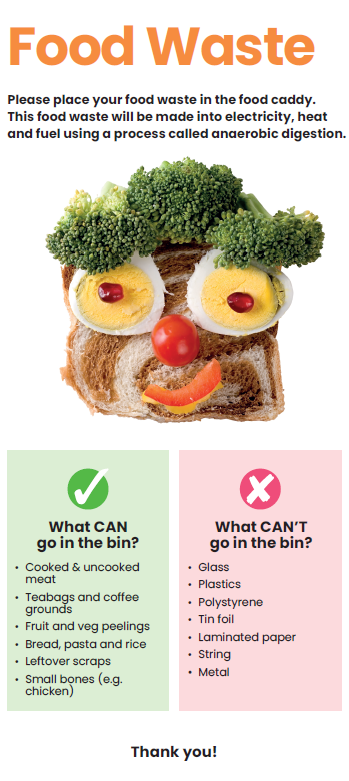Rethinking waste: Our journey towards more sustainable food practices
Posted on: 27 February 2024 in Issue 7
.png)
With its ambitious waste reduction targets and progress well underway to meeting these, this Sustainability Week we're looking at how the University is now turning food waste into valuable resources that cut greenhouse gas (GHG) emissions.
Historically, our food waste has been collected with general waste and incinerated, whereby heat and energy are recovered. This is better than it breaking down in landfill, which can release potent GHGs into the atmosphere. But it is still, not as efficient as a process called anaerobic digestion. In addition, the gases are captured and used as a fuel and to generate heat and energy – this process is up to 60% more efficient than incineration with energy recovery. The sludge that remains following anaerobic digestion is full of nutrients and is used as a fertiliser, so nothing goes to waste!
Separate collections for food waste have therefore now been installed for all Halls of Residence and Catering facilities, with the waste sent for anaerobic digestion. Over 800 food caddies were put out across all of the University’s accommodation buildings over the summer, ready for the return of our students in September. Information on sustainability and recycling was included in the Accommodation Handbooks, and Residential Advisors were informed of the new changes. New posters were also designed and put up in all kitchen spaces, providing our students with all the information they need to ensure they are disposing of their waste correctly. Recycling audits were also conducted by our students in November, in collaboration with the Guild, Halls team and SOS-UK, which gave them the opportunity to review how well students are using the recycling bins. The audits found that the food waste bins were being well utilised, with only small amounts of food waste found in the general waste bins.
Since the introduction of the food waste bins in September, over 22 tonnes of food waste have been recycled, which would have otherwise been disposed of in the general waste. Sending this food waste to anaerobic digestion instead of incineration with energy recovery, has cut the GHG emissions associated with the disposal of the food waste by over 58%, down from 468.182 kg CO2e to 196.064 kg CO2e.

Sam Hay, the University Waste and Recycling Officer said “I would like to thank both our Residential and Catering teams for all of their help in getting this off the ground, and making such a success of it. This wouldn’t have been possible without their dedication, hard work and enthusiasm. Our students have also done amazingly well in ensuring they are segregating their waste in the most sustainable manner possible”.
Sam Pope, Head of Accommodation said “Residential Services have really welcomed the Sustainability Team in terms of being able to collaborate and share knowledge and have a real understanding of how collectively we can achieve a much greater sustainability culture across the teams and students by engaging on awareness and individual responsibility to save energy, re-cycle and reuse, additionally there are a number of exciting projects we are working on that will help improve our halls performance and users of those buildings”
The University has an ambitious target to reduce general waste sent for incineration by 50%, by 2025, compared to a 10-year average prior to Covid-19. The target was developed in the Sustainability Strategy, and is directly supporting the sustainability aims committed to in Liverpool 2031, the University Climate Plan, and in the new Sustainability Strategy that will be published later this year. The 2022/2023 academic year saw a reduction of 32.75% in the amount of general waste sent for incineration compared to the 10-year average. We are also seeing a reduction over 17% so far this year (2023/2024), compared to 2022/2023, with the food waste recycling initiative playing a key role in this. Keep your eyes out for what we have planned next!
Find out more
To find out more and access guidance on the University’s waste reduction plans, disposal compliance, and related codes of practice please contact Sam Hay – s.hay@liverpool.ac.uk
For more information about sustainability plans and progress at University of Liverpool please contact the Sustainability Department by emailing sustainability@liverpool.ac.uk
Keywords: Sustainability, Food , Waste , Carbon Emissions , Sustainability Week.